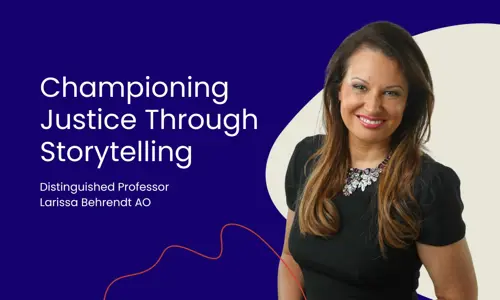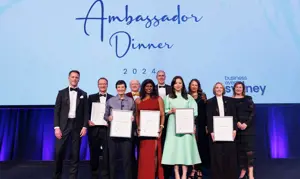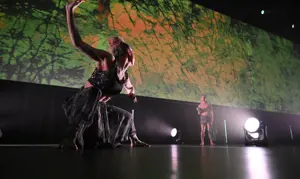Larissa Behrendt: Championing Justice Through Storytelling

Larissa Behrendt – a Euahleyai/Gamillaroi woman - is a BESydney Global Ambassador whose career spans law, literature, film, radio, education, and community advocacy. Her work is a testament to the power of storytelling in driving social change and elevating Indigenous voices.
From her work as a practitioner of the law to Distinguished Professor and the Laureate Fellow at the Jumbunna Institute at the University of Technology Sydney, her voice has helped shape Sydney’s reputation as a destination where ideas are shared, diverse perspectives are celebrated, and meaningful change begins.
Through her advocacy and creative leadership, Larissa has applied a global mindset to local priorities and has highlighted Sydney’s research capabilities, inspiring business events to serve as platforms for inclusion, cultural exchange and legacy impact.
Expanding Advocacy Through Creativity
Behrendt’s journey began in law, being the first Indigenous Australian to graduate from Harvard Law School, and primarily worked as an advocate for First Nations and Australian Indigenous rights. Behrendt’s passion for storytelling led her to explore more creative pathways.
“Honestly, [changing field] wasn't so much a transition as it was an expansion,” she says. “I realised storytelling through law could only get me so far. If I couldn't argue people into understanding, perhaps I could move them with stories instead.”
"Being an advocate was not just about speaking for others but sometimes it is about creating space for them to tell their own stories. Plus, who wouldn't want a job where going to the movies counts as research?"
Research Rooted in Justice
At the Jumbunna Institute for Indigenous Education and Research, Behrendt leads projects that tackle systemic issues through an Indigenous lens, particularly stories exploring justice and Indigenous rights.
Her current work includes:
- Collaborating with the Coalition of Peaks on Closing the Gap
- Reforming the child protection system
- Developing a bench book for the judiciary on Indigenous legal matters
- Documenting the oral history of the Aboriginal and Torres Strait Islander Commission (ATSIC)
Larissa’s vision for nurturing the next generation of Indigenous researchers embodies BESydney’s commitment to capacity building. Business events serve as incubators for emerging leaders, providing platforms for mentorship, visibility and collaboration.
“Currently, I'm juggling writing projects, a couple of documentaries, and always trying to remember where I left my coffee,” she jokes.
Harvard and the Global Perspective
Reflecting on the experiences she gained from her time at Harvard Law School: “It was a mixture of awe and ‘how did I even get here?’” she recalls. “Harvard opened doors and provided an international perspective on Indigenous rights.”
“It helped me more deeply understand [how] power imbalances occur within the law. It allowed me to see what was exceptional about Australia and what I wanted to [improve] when I returned home.”
Her global experiences of working across multiple First Nations organisations in Canada, New Zealand and Australia, and her passion for telling the unique story of Australia’s Indigenous peoples to international audiences align with BESydney’s mission to attract international events that foster cross-cultural exchange and policy innovation. Larissa’s insights help shape Sydney as a destination for thought leadership and global collaboration.
Impactful Storytelling Through Film
Behrendt’s documentaries have sparked national conversations. Her award-winning film After the Apology shed light on the ongoing crisis of Indigenous child removal. “It was powerful to see conversations ignite around Indigenous child removal and systemic issues,” she says.
“It gave me a chance to tell the stories of women who had been deeply harmed by having their children or grandchildren wrongfully removed and a chance to work with people I deeply admire.”
In Maralinga Tjarutja, a film directed by Behrendt, she honoured the resilience of a community affected by nuclear testing, carried out under legislation passed in 1952 that caused long-lasting health issues primarily amongst remote Indigenous communities in South and Western Australia.
“The biggest challenge was honouring the community’s story authentically,” she says. “They had a dignity with how they told the history of what had happened to them… I hope viewers felt both outraged and inspired by the community's strength and courage.”
Literary Recognition and Personal Reflections
Her novel Home, which won the David Unaipon Award and the Commonwealth Writer’s Prize, explores themes of identity and belonging. “I wanted to tell a story about family, identity and belonging that felt both deeply personal and broadly relatable,” she shares. “The recognition was genuinely humbling.”
Balancing law and the arts is no easy feat. “Balance is optimistic—it’s more of a strategic chaos,” she laughs.
"But each side informs the other. Advocacy needs storytelling, and art becomes richer through the lens of justice."
Looking Ahead: Empowering Future Leaders
Receiving the Human Rights Medal in 2021 was a moment of reflection and motivation. “It was deeply humbling and a bit surreal,” Behrendt says. "Fighting for social justice is a team effort...Recognition like that reminds me the work matters and needs to continue."
Her vision for the Jumbunna Institute is clear: “I want Jumbunna to continue being a powerful advocate for Indigenous rights, education and research, helping to shape public policy and empower communities.”
“Looking ahead, I hope Jumbunna continues to grow as a space that nurtures and champions the next generation of outstanding First Nations researchers and leaders who will carry the work forward with courage, insight and cultural strength.”
Words of Wisdom
To young Indigenous Australians, Behrendt offers heartfelt advice:
"Believe deeply in your voice. Your experiences, perspectives and stories matter. Don’t be afraid to challenge systems, ask difficult questions, and above all, keep your sense of humour. Trust me, you'll need it."
“Stay true to your values, especially when it’s hard. Those moments will define your integrity and your path. And don’t do it alone. Surround yourself with peers who lift you up and Elders who can ground you with wisdom. They’ll help you carry the fire and remind you who you are when the road gets tough.”


